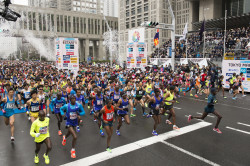Top 10 Tips for a First-Time Marathon Runner...

Jan 15, 2016 / News
I’m no expert on marathon training, but my editor, Chrissie Giles, had recently signed up for a marathon and wanted to pick my brains. So on the train back from London one evening, I wrote her a list of my top 10 tips for a first-timer, based on what I’d learned from running my first marathon in 2013. Nothing very clever—obvious stuff, really—but the sort of stuff you forget by the time you’re 12 weeks into a marathon training program and can’t find your own toes for blisters.
-
DEVISE A TRAINING PROGRAM THAT WORKS FOR YOU
Lots of training programs advise doing silly miles, even as a beginner. They say “rest is as important as running” but then tell you to run six days out of seven. These programs are written by people who have run too many marathons and lost perspective on what’s possible, or necessary, for a first-timer.
You also need to think about how to fit your training program around your life (which is important, too, remember). If you have dance classes—which you love—on Thursday nights and the training program says run eight miles on a Friday morning, change the training program so that you don’t have to run on tired legs. Don’t cancel the dance class.
-
DON’T PANIC!
Take it one week at a time. Know what miles (or “time on your feet”) you have to do that week and don’t get carried away thinking you should be running 20 miles every Sunday. There’s no need and you will only get injured or burn out before the race. Don’t worry about taking a couple of days off if you feel really tired or get ill. It’s much better to let your body recover and make the next session count—rather than trying to push it when you’re not feeling up to it.
-
DO SOME CORE STRENGTH EXERCISES
No need to go overboard, but you can look up some core stability exercises for runners online. Done a couple of times a week for 10 to 15 minutes, these are supposed to help in the later stages of a long run, where you start to flag and need to hold your form to make it to the end without dropping your pace too much.
-
WORK OUT YOUR HYDRATION STRATEGY
Hydration is one thing you can get really wrong. Through your long runs, work out how much to drink beforehand and how often you need to drink while running to prevent dehydration or needing the toilet. Then use that information to work out how much water to take at each water station—don’t take loads more just because it’s there. If it’s unexpectedly hot on race day, you will definitely need to adjust your strategy. And ultimately, if you get it wrong and need to stop to use the toilet, you’re just going to have to do it!
-
HAVE A DRESS REHEARSAL
Use one of your long runs as a dress rehearsal for marathon day. Do it far enough in advance that you’ve got time to make changes. No need to run 26 miles, obviously, but use it as an opportunity to run at the same time of day, in the same kit, on the same breakfast, with the same energy gels, etc., etc., so you can practice as many aspects of the race as possible. Then, if it works, don’t change a thing.
-
DON’T GET INJURED OR ILL
Running a marathon is mainly about getting your body to the start line in one piece. The worst thing you can do in the last few weeks is squander all your training (and fundraising) by picking up an ankle injury or the flu. So stick to what you know and stay well. Don’t take risks. Wash your hands like a good little girl and keep as far away from infectious people as possible. I even stayed away from crowded places e.g. cinema, swimming pool, etc.
-
REST BEFORE THE BIG DAY
In the week leading up to your marathon, I would just do a couple of fairly short easy runs to keep your legs ticking over. Maybe include a little burst at marathon pace, but no more. Even a gentle walk or two as stress beaters and to combat the feeling of complete stagnation. Under no circumstances do a training session—or any form of activity—that you wouldn’t normally do.
-
IGNORE EVERYONE ELSE
If everyone else is eating bananas before the race, piling on the layers, having foot massages or stocking up on some new brand of energy gel you’ve never heard of, just leave them to it. You know what nutrition works for you, how hot you get when it’s 17 degrees out, and so on.
Have faith in what your training sessions have taught you.
-
DON’T GO OFF TOO FAST
There’s a temptation to get carried along by the rush at the start and think you’ll be able to hold on later. If you haven’t run that fast or far before, it’s unlikely you’ll be able to hold the pace over 26 miles, so take it steady and make up the time in the later stages if you still feel good. I always think the psychological benefits of overtaking people must be more helpful at Mile 25 than at Mile 2.
-
KNOW YOUR PACE
You should know what pace you can run from your training sessions. Plan sensibly and try not to panic if you’re not quite hitting your goal pace every time. Try to be positive—think “Good, I’m nearly on target,” rather than “Oh no, I’m not going fast enough!”
You don’t need a really fancy watch, but one that will at least tell you your time per km or mile is really useful.
BE CALM, IT’LL BE FINE. TRY NOT TO GO MAD.
Culled from Pacific Standard
